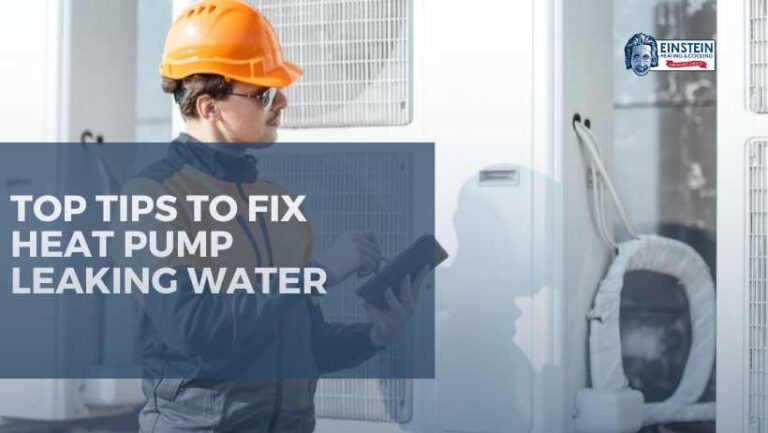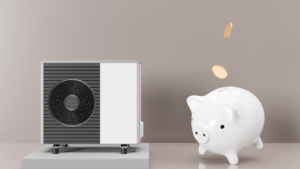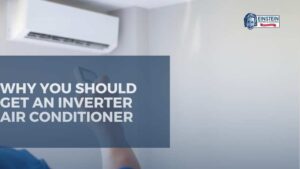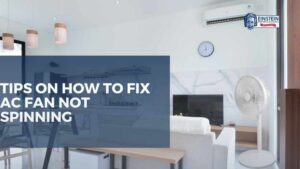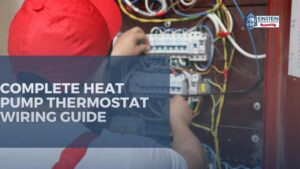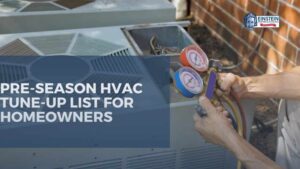Is your heat pump leaking water leaving you puzzled and concerned? A leaking heat pump can be a worrisome issue that requires prompt attention. In Central Oregon, where winters can be quite brisk, taking care of your heat pump becomes even more crucial. In this comprehensive guide, we will explore the various factors that may lead to a heat pump leaking water and provide solutions to help you address the issue effectively.
Factors Why Your Heat Pump Is Leaking Water
Condensate Drain Blockage
Clogged Drain Line
One of the most common reasons for a heat pump dripping water is a clogged condensate drain line. Over time, dust, debris, and algae can accumulate in the drain line, causing a blockage. When the drain line is blocked, water backs up and can eventually leak from your heat pump.
Solution:
- Locate the condensate drain line and inspect it for any visible clogs.
- Use a wet/dry vacuum to suction out the blockage.
- Pour a mixture of one part bleach and one part water down the drain line to prevent future algae growth.
Disconnected Drain Line
Is your heat pump dripping water? A disconnected or improperly connected drain line can also result in water leakage from the heat pump.
Solution:
- Ensure that the drain line is securely connected to both the heat pump and the drainage system. Make sure that your heat pump installation is done correctly.
- Check for any visible gaps or disconnections in the drain line and reconnect them if necessary.
Leaking Heat Exchanger
Cracked Heat Exchanger
A cracked heat exchanger can allow water to leak out of the heat pump. This is a serious issue that requires immediate attention as it can also pose health risks due to the potential release of harmful gases hence, a professional HVAC technician may be needed.
Solution:
- If you suspect a cracked heat exchanger, turn off the heat pump immediately and contact a professional HVAC technician for inspection and repair.
- Regular annual inspections can help detect potential issues with the heat exchanger before they escalate.
Humidifier Issues
Overfilled Humidifier
If your heat pump is equipped with a humidifier, overfilling it can lead to water leakage.
Solution:
- Check the humidifier water panel and adjust the water level according to the manufacturer’s recommendations.
- Regularly maintain and clean the humidifier to prevent mineral build-up and potential leaks.
Faulty Humidifier Solenoid Valve
A malfunctioning solenoid valve in the humidifier can cause water to continuously flow, leading to leakage.
Solution:
- Inspect the solenoid valve for any visible issues or damage.
- Replace the solenoid valve if it is malfunctioning or not closing properly.
Incorrectly Installed Flue Pipe
Improper Slope
If the flue pipe is not installed with the correct slope, condensation can accumulate and result in water leakage.
Solution:
- Ensure that the flue pipe has the proper slope to allow condensation to flow back into the heat pump.
- Adjust the slope if necessary to prevent standing water in the flue pipe.
Condensation Backup
Condensation backup in the flue pipe can occur if it is not adequately sized or if there are obstructions.
Solution:
- Check for any obstructions in the flue pipe and remove them.
- Consult with a professional HVAC technician to determine if the flue pipe needs resizing to accommodate condensation properly.
heat pump Air Filter
Dirty or Clogged Filter
A dirty or clogged heat pump air filter can restrict airflow, leading to excessive condensation and water leakage.
Solution:
- Regularly check and replace the heat pump air filter according to the manufacturer’s recommendations.
- Consider using high-efficiency filters to reduce the likelihood of clogs.
Incorrectly Sized Filter
Using a filter that is not the correct size for your heat pump can impede proper airflow and contribute to water leakage.
Solution:
- Verify the correct filter size for your heat pump and replace it with the appropriate one.
- Consult your heat pump’s manual or contact the manufacturer for guidance on the correct filter size.
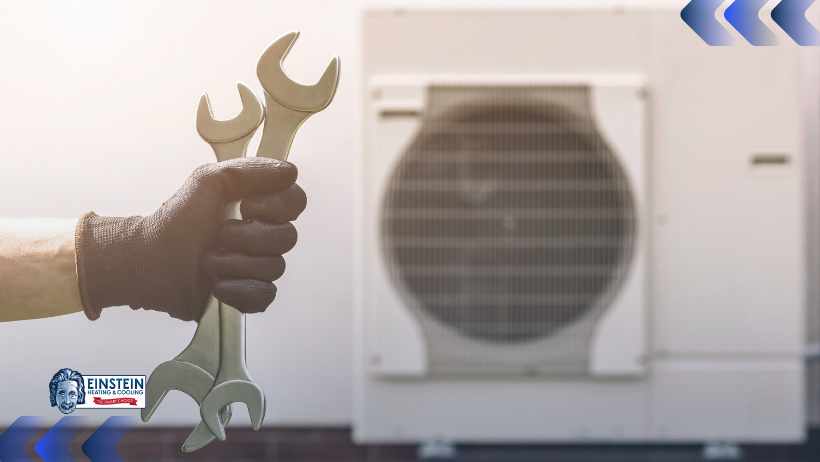
Flue Pipe Obstructions
Blocked Flue Pipe
Obstructions in the flue pipe can prevent proper ventilation and lead to condensation buildup, resulting in water leakage.
Solution:
- Inspect the flue pipe for any blockages, such as debris, nests, or other obstructions.
- Clear the flue pipe of any obstacles to ensure proper ventilation.
Vent Termination Issues
Improper vent termination can cause water to enter the heat pump, especially during heavy rain or snowfall.
Solution:
- Check the vent termination for any issues such as damage or blockages.
- Ensure that the vent termination is installed according to the manufacturer’s specifications. Contact your technician for needed heat pump repairs.
External Water Sources
Roof Leaks
If your heat pump is located in the attic, a leaky roof can lead to water entering the heat pump area.
Solution:
- Inspect the roof for leaks and repair any damaged areas promptly.
- Ensure proper insulation and ventilation in the attic to prevent condensation.
Basement Flooding
In homes with heat pumps located in the basement, flooding can result in water leakage.
Solution:
- Address any basement flooding issues promptly, including improving drainage and waterproofing measures.
- Elevate the heat pump or take preventive measures to protect it from potential water damage.
Ductwork Issues
Leaky Ducts
Leaky ducts can allow humid air to enter the heat pump system, leading to condensation and water leakage.
Solution:
- Inspect the ductwork for any visible leaks or gaps.
- Seal any leaks using duct tape or mastic to prevent humid air infiltration.
Poor Insulation
Inadequate insulation around ductwork can contribute to temperature variations, causing condensation and water accumulation.
Solution:
- Ensure proper insulation around ducts, especially in areas prone to temperature changes.
- Consider adding insulation to prevent condensation-related issues.
High-Efficiency heat pump Issues
Incorrect Venting
High-efficiency heat pumps require specific venting systems, and improper venting can lead to water leakage.
Solution:
- Verify that your high-efficiency heat pump is correctly vented according to manufacturer specifications.
- Consult a professional if modifications or adjustments are needed.
Lack of Maintenance Leading to Heat Pump Leaking Water
High-efficiency heat pumps demand regular heat pump maintenance, and neglecting this aspect can result in various issues, including water leakage.
Solution:
- Adhere to the manufacturer’s maintenance schedule for your high-efficiency heat pump.
- Schedule professional inspections to address potential issues promptly.
Aging Equipment
Deteriorating Components
As heat pumps age, various components may deteriorate, increasing the likelihood of water leakage.
Solution:
- Regularly inspect all heat pump components for signs of wear and tear.
- Consider proactive replacement of aging parts to prevent potential leaks.
Corroded Pipes
Corrosion in pipes and other metal components can compromise the integrity of the heat pump system, leading to leaks.
Solution:
- Check for signs of corrosion on pipes and other metal parts.
- Replace corroded components to prevent water leakage and ensure the heat pump’s longevity.
heat pump Maintenance Tips for Oregon Residents
Schedule Annual Professional Inspections
Regular Check-ups
To kick off your heat pump maintenance routine, make it a priority to schedule an annual professional inspection. A certified HVAC technician can identify and address potential issues before they escalate, ensuring your heat pump runs smoothly throughout the winter. You can also check if a heat pump is the best or compare heat pumps and furnaces for your needs. Regular check-ups can catch problems early, preventing costly repairs and extending the lifespan of your unit.
Combustion Analysis
During a professional inspection, ask the technician to perform a combustion analysis. This process assesses the efficiency of your heat pump by analyzing the combustion gases. Adjustments can be made to optimize performance, leading to better fuel efficiency and reduced energy costs.
2. Change Air Filters Regularly
Monthly Checks
One of the simplest yet most effective heat pump maintenance tips is to regularly replace the air filters. Clogged or dirty filters can restrict airflow, forcing your heat pump to work harder and consuming more energy. Check your filters monthly, especially during peak usage in the winter, and replace them as needed. This not only ensures efficient operation but also contributes to better indoor air quality.
Filter Type
Selecting the right filter is essential. High-efficiency filters may trap more particles, but they can also impede airflow. Consult your heat pump manual or an HVAC professional to determine the most suitable filter for your system and household needs.
3. Keep Vents and Registers Clear
Furniture Arrangement
Take a walk around your home to ensure that vents and registers are not obstructed by furniture or other items. Proper airflow is crucial for your heat pump to distribute heat evenly. Rearrange furniture if necessary, allowing warm air to circulate freely throughout each room.
Cleaning
Regularly clean vents and registers to remove dust, pet hair, and other debris. A vacuum cleaner with a nozzle attachment can be used to gently remove accumulated dirt. Keeping these components clean promotes better indoor air quality and prevents unnecessary strain on your heat pump.
Conclusion
A heat pump leaking water can stem from various factors. Regular maintenance, timely inspections, and prompt resolution of issues are crucial in preventing and addressing heat pump water leakage. If you encounter persistent or severe problems, it is advisable to seek the expertise of a professional HVAC technician from Einstein Heating and Cooling to ensure the safety and efficiency of your heating system. By addressing the root causes and implementing preventive measures, you can keep your heat pump running smoothly and avoid the inconvenience of water leaks.

